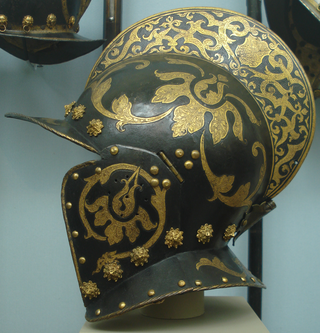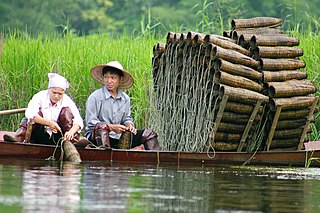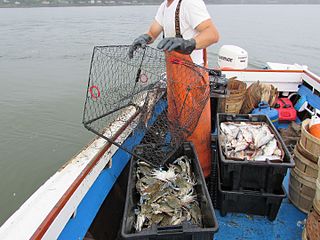
The American lobster is a species of lobster found on the Atlantic coast of North America, chiefly from Labrador to New Jersey. It is also known as Atlantic lobster, Canadian lobster, true lobster, northern lobster, Canadian Reds, or Maine lobster. It can reach a body length of 64 cm (25 in), and a mass of over 20 kilograms (44 lb), making it not only the heaviest crustacean in the world, but also the heaviest of all living arthropod species. Its closest relative is the European lobster Homarus gammarus, which can be distinguished by its coloration and the lack of spines on the underside of the rostrum. American lobsters are usually bluish green to brown with red spines, but several color variations have been observed.

Olive Garden is an American casual dining restaurant chain specializing in Italian-American cuisine. It is a subsidiary of Darden Restaurants, Inc., which is headquartered in Orange County, Florida. As of 2012, Olive Garden restaurants accounted for $3.8 billion of the $6.9 billion revenue of parent Darden.

Shabu-shabu is a Japanese nabemono hotpot dish of thinly sliced meat and vegetables boiled in water and served with dipping sauces. The term is onomatopoeic, derived from the sound – "swish swish" – emitted when the ingredients are stirred in the cooking pot. The food is cooked piece by piece by the diner at the table. Shabu-shabu is generally more savory and less sweet than sukiyaki.

The clambake or clam bake, also known as the New England clambake, is a traditional method of cooking seafood, such as lobster, mussels, crabs, scallops, soft-shell clams, and quahogs. The food is traditionally cooked by steaming the ingredients over layers of seaweed in a pit oven. The shellfish can be supplemented with vegetables, such as onions, carrots, and corn on the cob. Clambakes are usually held on festive occasions along the coast of New England, and at fundraisers and political events. Some restaurants and caterers offer clambake-style food.

Red Lobster Hospitality LLC is an American casual dining restaurant chain headquartered in Orlando, Florida. The company has operations across most of the United States and Canada, as well as in China, Ecuador, Hong Kong, Japan, Malaysia, Mexico, Philippines, Turkey and the United Arab Emirates; as of June 23, 2020, the company had 719 locations worldwide. Golden Gate Capital became Red Lobster's parent company when it was acquired from Darden Restaurants on July 28, 2014. Seafood supplier Thai Union acquired a 25 percent stake in the company in 2016 for a reported $575 million, and in 2020 purchased the remaining portion from GGC.
Darden Restaurants, Inc. is an American multi-brand restaurant operator headquartered in Orlando. As of January 2022, the firm owns two fine dining restaurant chains: Eddie V's and The Capital Grille; and six casual dining restaurant chains: Olive Garden Italian Restaurant, LongHorn Steakhouse, Bahama Breeze, Seasons 52, Yard House and Cheddar's Scratch Kitchen. Until July 28, 2014, Darden also owned Red Lobster. Darden has more than 1,800 restaurant locations and more than 175,000 employees, making it the world's largest full-service restaurant company.

Lobsters are widely fished around the world for their meat. They are often hard to catch in large numbers, but their large size can make them a profitable catch. Although the majority of the targeted species are tropical, the majority of the global catch is in temperate waters.

A lobster trap or lobster pot is a portable trap that traps lobsters or crayfish and is used in lobster fishing. In Scotland, the word creel is used to refer to a device used to catch lobsters and other crustaceans. A lobster trap can hold several lobsters. Lobster traps can be constructed of wire and wood, or metal and netting or rigid plastic. An opening permits the lobster to enter a tunnel of netting or other one-way device. Pots are sometimes constructed in two parts, called the "chamber" or "kitchen", where there is bait, and exits into the "parlour", which prevents escape. Lobster pots are usually dropped to the sea floor, one or more at a time, sometimes up to 40 or more, and are marked by a buoy so they can be picked up later.

The burgonet helmet was a Renaissance-era and early modern combat helmet. It was the successor of the sallet.

The lobster-tailed pot helmet, also known as the zischägge, horseman's pot and harquebusier's pot, was a type of post-Renaissance combat helmet. It became popular in Europe, especially for cavalry and officers, from c. 1600; it was derived from an Ottoman Turkish helmet type. The helmet gradually fell out of use in most of Europe in the late 17th century; however, the Austrian heavy cavalry retained it for some campaigns as late as the 1780s.

A fish trap is a trap used for fishing. Fish traps include fishing weirs, lobster traps, and some fishing nets such as fyke nets.

A morion is a type of open-faced combat helmet originally from the Kingdom of Castile (Spain), used from the beginning 16th to early 17th centuries, usually having a flat brim and a crest from front to back. Its introduction was contemporaneous with the exploration of North, Central and South America. Explorers such as Hernando de Soto and Coronado may have supplied them to their foot soldiers in the 1540s.

The Shore Club is a restaurant and live music venue located in Hubbards, Nova Scotia. Built by Roy Harnish in 1946, it has become locally renowned for serving a lobster supper. Now in the third generation of owners, Shore Club bids itself as the "Original Nova Scotian Lobster Supper" and also the "Last of the Great Dance Halls" built after the Second World War. Notable musical acts that have performed at the Shore Club include Joel Plaskett, Matt Mays, Wintersleep and Classified.

Panulirus pascuensis is a species of spiny lobster found around Easter Island and the Pitcairn Islands in the Pacific Ocean. It is known in English as the Easter Island spiny lobster, Langosta de Isla de Pascua in Spanish and Ura in the Rapa Nui language. This lobster is fished on a small scale for local consumption.

Crab traps are used to bait, lure, and catch crabs for commercial or recreational use. Crabbing or crab fishing is the recreational hobby and commercial occupation of fishing for crabs. Different types of traps are used depending on the type of crab being fished for, geographic location, and personal preference.
Colin Pressdee is a food writer, broadcaster and consultant living in London.

Hot pot or hotpot, also known as soup-food or steamboat, is a cooking method that originated in China. A heat source on the dining table keeps a pot of soup stock simmering, and a variety of Chinese foodstuffs and ingredients are served beside the pot for the diners to put into the hot stock.
An all-you-can-eat restaurant (AYCE) is a type of restaurant in which a fixed price is charged for entry, after which diners may consume as much food as they wish. All-you-can-eat establishments are frequently buffets.

Pike Place Chowder is a seafood restaurant with two locations in Seattle, in the U.S. state of Washington.















